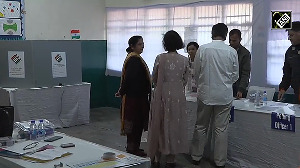'India cannot be a partner and a target at the same time'
Courting the US Congress (the American parliament) is indeed a hazardous pursuit as the Hill is the battleground of diverse lobbies and interests. Although it is fashionable today for senior diplomats and even ministers to lobby Congressmen directly, it is a moot point whether we should expose policy makers like the foreign secretary to the vagaries of Congressional politics, especially when it is primarily the responsibility of the Bush administration to see the nuclear deal through Congress.
Nuclear deal: Saran meets key lawmakers
Though Saran was quite forthright in his views, the visit may have indicated receptivity to changes that may be sought in the deal. He has also come under direct pressure on issues like Iran.
Ambassador Naresh Chandra used to say that a casualty of the Indian nuclear tests of 1998 was his pair of Bally shoes. For our Congressional officer, Taranjit Sandhu and me, the loss of leather was even more as we not only accompanied him, but also had our own meetings with 'freshmen' and staffers.
The spacious offices of the Congressmen and Senators are spread far and wide on Capitol Hill and long walks on the marble floors are inescapable even after mastering the geography of the place with its labyrinthine corridors, under passages and elevators.
Walking is not the only hazard in seeking to lobby Congressmen and Senators as Foreign Secretary Saran may have just found out.
Getting appointments with the right legislators at the right time is an art in which staffers, lobbyists and Indian community leaders play a role. In a celebrated case, we had to rope in a community leader to get a meeting for our foreign minister to meet a Senator. They are in Washington only when Congress is in session and their time is dictated by their commitments on the floor. When a division bell rings, they disappear even in the middle of meetings and their return time is uncertain. We have had to hang around for hours and leave after briefing the staffers.
I had a Cabinet minister leaving a US Congressman's office in a huff after waiting for him for a long time.
India's efforts to drum up support for N-deal hit glitch
The code of ethics of Congressmen is another hurdle. If a foreign diplomat invites a US Congressman to a meal, the guest has to pay for the meal himself. A US Congressman will do that only when he has to gain something from the diplomat like getting a lobbying contract for one of his associates. They can come to parties only if there are a dozen of them present. There are loopholes in the law, on which the lobbyists are the experts, but by and large the diplomats have to work hard to even get the ears of US Congressmen.
Party affiliation, by itself, does not determine the views of US Congressmen. The nature and needs of their constituencies, the contributions they have received, the nature of the introduction and other personal factors weigh heavily on their positions. Their voting record on issues like human rights and non-proliferation give us insights into their attitude to India.
Even the membership of the India Caucus does not mean automatic support for India. At the time of the May 1998 nuclear tests, the acknowledged friends of India, including leaders of the Caucus turned against us. A co-chairman of the India Caucus came to a Republic Day function and chastised India for sending mixed messages on foreign policy.
The leaders of the India Caucus were agitated when they heard first about our air bombardment in Kargil. Many of them do not see any contradiction between their membership of the Caucus and signing letters given to them by anti-India lobbyists.
Non-proliferation is a bee in many a bonnet and many US Congressmen cannot think outside the box on this issue. Where they make a change in their traditional positions, like in the case of Congressman Tom Lantos, Congressman Dan Burton or Senator John Kerry, it is in pursuit of some other objective, which may not be possible for us to meet.
I have alleviated Lantos' Iran concerns: Saran
The conversations with US Congressmen do not remain confidential as the staffers leak stories to sustain or build images of their principals in their constituencies and on the national scene. The change will be slow in coming, if at all, because of their compulsion to convince their constituencies before they take new initiatives.
The involvement of the voters in the postures adopted by Congressmen is substantial in the US Congress.
The good news is that, with all its independence and personal predilections of individual members of the House and the Senate, the position of the administration is a determining factor in the eventual decision making.
'Congress will approve the deal
The story of the sanctions imposed by the Clinton administration against India is a case in point. In the immediate aftermath of the tests, there was no dissenting voice except those of India loyalists like Frank Pallone. But the move for removing the sanctions in stages came from Congress itself in the form of the Brownback Amendments when the administration was ready to make changes and there was no great opposition even from the non-proliferation lobby.
There have been many instances of the administration and Congress working in tandem on foreign policy issues. An expert in this area, (Assistant Secretary for South Asian Affairs in the Clinton administration Karl F) 'Rick' Inderfurth, told me recently that the deal will go through the Congress in the end.
Direct lobbying by policy makers on the Hill has its grave hazards, even if there may be a 'feel good' factor in establishing contacts and giving a strong message. But there is considerable merit in leaving the lobbying in Congress to the ambassador and his colleagues, who can absorb the shocks, but also feel the pulse on the Hill.
Complete coverage: The Bush visit | The Bush visit Chats | The nuclear deal






 © 2025
© 2025